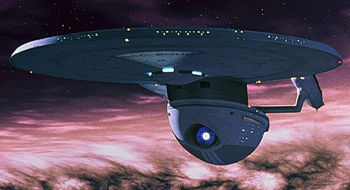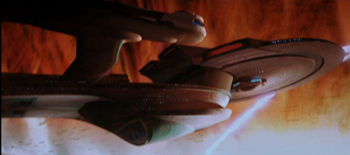Excelsior class

Excelsior class (ST06)
On Reference Stardate 2/2210 (October 2285), the U.S.S. Excelsior NX-2000, the first of a new class, was commissioned. The newest vessel in Starfleet at the time, it incorporated many experimental systems,[1] including the transwarp drive, earning it the nickname "The Great Experiment"[2] among those in influential circles. With so many new systems aboard these vessels, the process of testing them was slow. Prior to being installed, each component was tested and retested until it met standards. Nevertheless, when the Excelsior was taken out for trials, the evaluation teams were constantly faced with primary system malfunctions that would not allow any of the secondary or backup systems to be tested. This caused the evaluators to deal with these new components on a one-at-a-time basis, thus creating time delays in the commissioning of the class.[1]
The Excelsior class underwent a number of late design changes when the transwarp project ultimately failed. While transwarp was never realized, designers were unwilling to cast aside what was otherwise a sound cruiser design. The transwarp engines were removed in favor of conventional warp drive engines. The Excelsior class could cruise at Warp 8 (OCU), sustain speeds of Warp 10 (OCU) for several hours, and reach Warp 13 (OCU) when necessary. This made it by far the fastest Starfleet vessel for almost five decades.[3]
After these changes were made, Starfleet built a second ship of the class, the U.S.S. Proxima NCC-2001, which finished her trials on Reference Stardate 2/2302 (February 2286)[4] and was commissioned immediately thereafter. The U.S.S. Columbia NCC-2002 was also completed on 2/2302, while the U.S.S. Galacta NCC-2003 was commissioned on 2/2406 (June 2287). All of these ships were constructed at shipyards orbiting Earth and Mars.[1][5]
A state-of-the-art capital ship with impressive size, speed, and tactical characteristics, the Excelsior class was well-suited for a number of mission roles. Specializing in emergency response and long-range exploration, the Excelsior class also distinguished itself through superior firepower and the ability to project force into neighboring sectors. They served as the mainline fleet vessel for Starfleet after the retirement of the Constitution class, and before the wide-scale use of Ambassador class ships. They frequently operated as command and control vessels, dictating fleet actions. A number of scientific laboratories and the ability to launch long-range probes also made the class viable for exploration and scientific missions. As a support vessel, the ship's sensor capabilities were average for its class, while its operations and computer systems were top of the line. A large shuttlebay and ample cargo room gave the class the ability to operate in a number of auxiliary roles, such as colony supply, emergency relief, and deep-space surveying missions.[3]

Excelsior class refit U.S.S. Enterprise NCC-1701-B (ST07)
The flagship of Starfleet, the U.S.S. Enterprise NCC-1701-B, was commissioned as an Excelsior class vessel,[5][6][7] while the Excelsior herself went on to a fine and distinguished career under Captain Hikaru Sulu.[8] The U.S.S. Gorkon NCC-40521 and U.S.S. Cairo NCC-42136, commanded by Captains Nechayev and Jellico, respectively, saw extensive action against the Tholians and Cardassians in a number of conflicts.[3]
Tactically, the Excelsior class was the most powerful Starfleet vessel fielded during the 23rd and early 24th centuries. Mounting several Type-VIII phaser banks, the Excelsior's firepower provided it with excellent strike capabilities. The addition of Mk 22 direct-fire photon torpedoes allowed the class to lay down multiple fields of fire. Supplemented by the proven CIDSS-2 shield system, the class enjoyed significant combat endurance.[3]
During the Cardassian and Dominion wars, the Excelsior class was an oft-seen combatant on the front lines. Excelsior class cruisers fought at the Chin'toka, Archanis, and Bolian sectors, to name a few, in the latter parts of the Dominion War.[3]
FASA Timeline
On Reference Stardate 2/2210 (October 2222), the U.S.S. Excelsior NX-2000, the first of a new class, was commissioned. The newest vessel in Star Fleet at the time, it incorporated many experimental systems,[1] including the transwarp drive, earning it the nickname "The Great Experiment"[2] among those in influential circles. With so many new systems aboard these vessels, the process of testing them was slow. Prior to being installed, each component was tested and retested until it met standards. Nevertheless, when the Excelsior was taken out for trials, the evaluation teams were constantly faced with primary system malfunctions that would not allow any of the secondary or backup systems to be tested. This caused the evaluators to deal with these new components on a one-at-a-time basis, thus creating time delays in the commissioning of the class.[1]
Star Fleet built a second ship of the class, the U.S.S. Proxima NCC-2001, which finished her trials on Reference Stardate 2/2302 (February 2223)[4] and was commissioned immediately thereafter. The U.S.S. Columbia NCC-2002 was also completed on 2/2302, while the U.S.S. Galacta NCC-2003 was commissioned on 2/2406 (June 2224). All of these ships were constructed at shipyards orbiting Earth and Mars.[1][5] The flagship of Starfleet, the U.S.S. Enterprise NCC-1701-B, was commissioned as an Excelsior class vessel.[5]
Statistics
| Mk I[1] | Mk II[1][5] | Mk III[9] | Mk IV[3] | Mk V[10][11] | |
|---|---|---|---|---|---|
| Date Entered Service | 2/2210 (Oct 2285) | 2/2303 (Mar 2286) | 2287 | 2331 | Unk. |
| Number Constructed | 1 | 38 | Unk. | Unk. | Unk. |
| Length | 467m | 467m | 470m | 470m | 511.25m |
| Width | 186m | 186m | 266m[3] | 266m | 195.64m |
| Height | 78m | 78m | 111m[3] | 111m | 86.76m |
| Decks | Unk. | Unk. | 30 | 30 | 30 |
| Mass | 239,930mt | 243,610mt[1] / 239,645mt[5] | Unk. | Unk. | 2,350,000mt |
| Cargo Capacity | 27,500mt | 27,500mt[1] / 5,000mt[5] | Unk. | Unk. | Unk. |
| Computer Type | M-8 | M-8 | Unk. | Unk. | Unk. |
| Transporters (Personnel) | 6 | 6 | 4 | 4 | 4 |
| Transporters (Emergency) | 6 | 6 | 4 | 4 | 4 |
| Transporters (Cargo) | 3 | 3 | 5 | Unk. | 5 |
| Crew | 810 | 802 | 770 | 650 | 750 |
| Passengers | 40 | 40 | Unk. | Unk. | 130 |
| Evacuation Limit | Unk. | Unk. | 3,500 | Unk. | 9,800 |
| Shuttlecraft | 20 | 20 | 7[3] | 7 | Unk. |
| Cruising Speed | Warp 12 (OCU) | Warp 12 (OCU) | Warp 10 (OCU)[3] / Warp 9 (MCU) | Warp 9.2 (MCU) | Warp 9 (MCU) |
| Emergency Speed | Warp 14 (OCU) | Warp 14 (OCU) | Warp 13 (OCU)[3] / Warp 9.2 (MCU) for 12 hours | Warp 9.8 (MCU) | Warp 9.2 (MCU) for 12 hours |
| Weapons | 8 FH-11 Phasers in 4 banks; 8 FH-5 Phasers in 4 banks | 10 FH-11 Phasers in 5 banks | Type VIII Phasers | Type VIII Phasers | Type IX Phasers |
| 4 torpedo tubes | 6 torpedo tubes | 6 torpedo tubes[3] | 6 torpedo tubes | 4 torpedo tubes |
Excelsior class vessels
U.S.S. Agincourt NCC-38762 • U.S.S. Al-Batani NCC-42995 • U.S.S. Berlin NCC-14232 • U.S.S. Cairo NCC-42136 • U.S.S. Charleston NCC-42285 • U.S.S. Crazy Horse NCC-50446 • U.S.S. Crockett NCC-38955 • U.S.S. Enterprise NCC-1701-B • U.S.S. Excelsior NCC-2000 • U.S.S. Farragut NCC-2582 • U.S.S. Fearless NCC-14598 • U.S.S. Fredrickson NCC-42111 • U.S.S. Gorkon NCC-40512 • U.S.S. Grissom NCC-42857 • U.S.S. Hood NCC-42296 • U.S.S. Intrepid NCC-38907 • U.S.S. Jackson • U.S.S. Lakota NCC-42768 • U.S.S. Lexington NCC-14427 • U.S.S. Livingston NCC-34099 • U.S.S. Malinche NCC-38997 • U.S.S. Melbourne NCC-62043 • U.S.S. Okinawa NCC-13958 • U.S.S. Repulse NCC-2544 • U.S.S. Roosevelt NCC-2573 • U.S.S. Tecumseh NCC-14934 • U.S.S. Thunderer • U.S.S. Valley Forge NCC-43305
FASA Timeline
U.S.S. Achilles NCC-2011 • U.S.S. Agincourt NCC-2014 • U.S.S. Ajax NCC-2010 • U.S.S. Alamo NCC-2035 • U.S.S. Aquila NCC-2028 • U.S.S. Arizona NCC-2012 • U.S.S. Bearn NCC-2027 • U.S.S. Brisbane NCC-2030 • U.S.S. Challenger NCC-2023 • U.S.S. Chikuma NCC-2008 • U.S.S. Columbia NCC-2002 • U.S.S. Constitution NCC-2025 • U.S.S. de Mayo NCC-2029 • U.S.S. Eagle NCC-2031 • U.S.S. Enterprise NCC-1701-B • U.S.S. Excalibur NCC-2004 • U.S.S. Excelsior NX-2000 • U.S.S. Exeter NCC-2016 • U.S.S. Fearless NCC-2036 • U.S.S. Fuso NCC-2019 • U.S.S. Galacta NCC-2003 • U.S.S. Hancock NCC-2006 • U.S.S. Hood NCC-2017 • U.S.S. Intrepid NCC-2020 • U.S.S. Kitty Hawk NCC-2007 • U.S.S. Kongo NCC-2009 • U.S.S. Lexington NCC-2026 • U.S.S. Potemkin NCC-2005 • U.S.S. Proxima NCC-2001 • U.S.S. Royal Oak NCC-2013 • U.S.S. Ryujo NCC-2022 • U.S.S. Sussex NCC-2024 • U.S.S. Thunderer NCC-2032 • U.S.S. Ticonderoga NCC-2034 • U.S.S. Valiant NCC-2018 • U.S.S. Yamashiro NCC-2015 • U.S.S. Yorktown NCC-2033
SFC Timeline
U.S.S. Berlin NCC-14232 • U.S.S. Cairo NCC-42136 • U.S.S. Charleston NCC-42285 • U.S.S. Crazy Horse NCC-50446 • U.S.S. Crockett NCC-38955 • U.S.S. Excelsior NX-2000 • U.S.S. Fearless NCC-14598 • U.S.S. Hood NCC-42296 • U.S.S. Intrepid NCC-38907 • U.S.S. Livingston NCC-34099 • U.S.S. Melbourne NCC-62043 • U.S.S. Potemkin NCC-18253 • U.S.S. Repulse NCC-2544 • U.S.S. Roma NCC-2010
Mirror Universe
Myriad Universes
Notes and References
- ↑ 1.0 1.1 1.2 1.3 1.4 1.5 1.6 1.7 1.8 1.9 Brown, Forest G. (Author). Federation Ship Recognition Manual. Star Trek: The Role Playing Game. Book 2302 , Second Edition. Cover art by Dana Knutson. Illustrations by Dana Knutson and Robert Oswald. FASA Corporation. 1985.
- ↑ 2.0 2.1 Bennett, Harve (Producer). Star Trek III: The Search for Spock. Directed by Leonard Nimoy. Written by Harve Bennett. Paramount Pictures. 1 June 1984.
- ↑ 3.00 3.01 3.02 3.03 3.04 3.05 3.06 3.07 3.08 3.09 3.10 3.11 Heinig, Jess Ross A. Isaacs (Line Developers). Starships. Star Trek Roleplaying Game. Book 4. Written by Bill Bridges, Andrew Greenberg, Kenneth Hite, Ross A. Isaacs, and Doug Sun. Illustrations by David Pipgras. Decipher, Inc.. 2003.
- ↑ 4.0 4.1 The Reference Stardate for the Proxima's commissioning was given as 2/2312 in the TNG Officer's Manual, which postdates the next several ships in the line by several months. As all other ships were given sequentially chronological dates, it appears that this was a typographical error, and has been corrected for this entry.
- ↑ 5.0 5.1 5.2 5.3 5.4 5.5 5.6 Stuart, Rick (Author). Star Trek: The Next Generation Officer's Manual. Star Trek: The Role Playing Game. Book 2012 . Cover design by Jim Nelson. Illustrations by Rob Caswell, David R. Deitrick, A.C. Farley, Dana Knutson, Jim Nelson, Jeff Laubenstein, and Todd F. Marsh. Deck plans by Steve Venters. Cutaway illustrations by David R. Deitrick. Ship illustrations by Dana Knutson. FASA Corporation. 1988.
- ↑ "Star Trek: The Next Generation Technical Manual." Book. November 1991. Pocket Books.
- ↑ Berman, Rick (Producer). Star Trek: Generations. Directed by David Carson. Story by Rick Berman & Ronald D. Moore & Brannon Braga. Screenplay by Ronald D. Moore & Brannon Braga. Paramount Pictures. 18 November 1994.
- ↑ Jaffe, Steven-Charles & Ralph Winter (Producers). Star Trek VI: The Undiscovered Country. Directed by Nicholas Meyer. Story by Leonard Nimoy and Lawrence Konner & Mark Rosenthal. Screenplay by Nicholas Meyer & Denny Martin Flinn. Paramount Pictures. 6 December 1991.
- ↑ Isaacs, Ross (Line Developer). Core Rule Book. Star Trek: The Next Generation Roleplaying Game. LUG25000 Book 25000. Designed by Christian Moore, Ross Isaacs, Kenneth Hite, and Steve Long. Written by Edward Bolme, James Cambias, Andrew Greenberg, Harry Heckel, Kenneth Hite, Ross A. Isaacs, Robin D. Laws, Steve Long, Christian Moore, Tim O'Brien, Chris Pramas, John Snead, and Greg Stolze. Original art by John Bridges, Carol Heyer, and Mark Maxwell. Last Unicorn Games, Inc.. August 1998.
- ↑ Zimmerman, Herman et al (Authors). Star Trek: Deep Space Nine Technical Manual. Star Trek: Deep Space Nine. Book. Pocket Books. 1998.
- ↑ "Core Game Book." Star Trek: Deep Space Nine Roleplaying Game, Supplement 35000. Game. 1999. Last Unicorn Games, Inc.